动物 - 维基百科,自由的百科全书
| 动物界 化石时期:成冰纪至今, | |
|---|---|
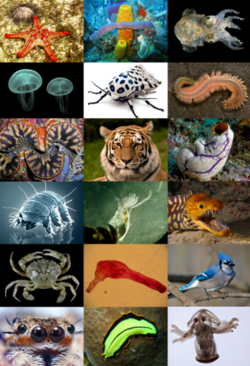 | |
| 科学分类 | |
| 域: | 真核域 Eukaryota |
| 演化支: | 單鞭毛生物 Amorphea |
| 演化支: | OBA 超類群 Obazoa |
| 演化支: | 後鞭毛生物 Opisthokonta |
| 总界: | 動物總界 Holozoa |
| 演化支: | 蜷絲動物 Filozoa |
| 演化支: | 領鞭毛動物 Choanozoa |
| 界: | 动物界 Animalia Linnaeus, 1758 |
| 门 | |
| 異名 | |
| |
动物(animal)或稱后生动物(学名:Metazoa),是一群具有自主移动性的多细胞真核生物,在生物分類學上構成名為动物界(学名:Animalia)的分類階層,与植物、真菌和原生生物一起构成了生物三大域中的真核域。
动物主要分基群的多孔动物和具有宏观移动性的真后生动物,后者细分为刺胞动物、栉板动物、扁盘动物和两侧对称动物,共五大总门。多数通俗意义上的现存动物物种都属于两侧对称动物,身体结构至少在胚胎发育时期会沿着纵轴正中矢状面呈现左右对称,其中最为突出的是原口动物和后口动物两大演化支,前者包括大部分无脊椎动物,如节肢动物、软体动物、环节动物、扁形动物等,其中前两者的物种多样性最为繁盛;后者则包括了棘皮动物、半索动物和脊索动物,其中最为成功的类群是脊索动物的冠群——脊椎动物(有头类)。除了少数与藻类形成共生的特例外,绝大多数动物是异养生物,必须从别处觅食摄取有机物来满足代谢需求,除少数物种外都必须呼吸氧气满足细胞呼吸,具有一定移动性和一定程度特化的肌肉细胞,其中真后生动物大多拥有神经组织。动物主要依赖有性生殖进行繁衍,而且其胚胎发育过程从空心细胞球(囊胚)开始,会经历一系列生命周期最终发展成性成熟的成体。
在元古宙后期的拉伸纪晚期,多细胞生物终于结束了“无聊十亿年”的硫化缺氧窘境,伴随着新元古代氧化事件出现了以原始海绵为代表的最早的动物生命形式。所有现存动物共有的6331个基因组已经被确认,这些基因可能来自6.5亿年前的一个前寒武纪的共同祖先。在成冰纪雪球地球事件的大冰期消退后,早期动物在埃迪卡拉纪出现了第一次演化辐射——阿瓦隆大爆发,出现了以埃迪卡拉生物群为代表的一大类结构复杂的生物,其中包括最早的刺胞动物和两侧对称动物。在埃迪卡拉纪末灭绝事件之后,大约5.42亿年前开始的寒武纪大爆发在较短期内出现了许多具有矿化骨骼和快速运动能力的海洋生物,就化石记录来看大多数现代动物所在的门都演化自这些寒武纪生物。这些早期动物的后裔在之后显生宙的5.4亿年间经历了五次大规模的和不计其数的中小型灭绝事件,只有约千分之一的物种延续至今,其余全部灭绝消亡且只有少数留有化石记录。
目前已有逾150万个现生动物物种被发现和命名,个体的尺寸从8.5微米(0.00033英寸)到33.6米(110英尺)不等。各个动物类群与其栖息环境、生态位和与其它生物之间的关系有着复杂的相互作用,形成了繁杂的生态系统和食物网。在所有现存动物中,节肢动物、软体动物和脊椎动物是最为成功的“御三家”,占据了食物链几乎所有中上级的生态位,而其余的动物类群则主要承担食物网底层的初级消费者、食腐/食碎屑者或寄生者的角色。这其中物种多样性最丰富的類群是节肢动物门下六足亚门的昆虫纲,现已知约有100万种;但最具有强势地位的是脊椎动物,从泥盆纪开始就占据了所有水生、半水生和陆生环境的顶级生态位,特别是哺乳纲灵长目的智人更是成为了能建立文明、开发原子能并探索宇宙的智慧生物。
在生物分类学上,古典希腊时期的亚里士多德曾將动物分为“有血液的”和“无血液的”。1758年,瑞典生物學家卡尔·林奈在其所著《自然系统》一书中创建了第一个系统的动物分类法,开始使用“界、纲、目、属、种”五个分类阶元的二名法。1796年,法国动物学家皮埃尔·安德烈·拉特雷耶首次将“科”作为“目”和“属”之间的过渡阶元加入分类法。1809年,法国博物学家让-巴蒂斯特·拉马克将林奈分类法扩展到14个门级分类单元。1866年,德国动物学家恩斯特·海克尔首次提出用“门”将动物的体型呈现进行类群粗分,并在1874年将动物界分为多细胞的后生动物(动物的异名)和单细胞的原生动物,单细胞生物不再被视为动物。在现代,动物分类学依赖分子生物学的先进分析技术并结合了支序分类学的理念建立了更为科学的分子系统发生学,能够更精准的证明动物分类单元之间的演化关系,并在林奈二名法的基础上加入“亚种”形成三名法作为新的命名标准。
在人类发展的过程中,动物产品(如肉、蛋和奶)一直是重要的食物来源,源自其它动物的皮、毛、羽和脂肪则被用作保温材料、取暖照明的燃料以及减少机械材料损蚀的润滑剂和防锈剂,动物骨骼、牙齿和犄角在石器时代还曾被用来制作渔具、武器和建筑材料,甚至在农业革命后的信史时期仍被用作装饰品。一些动物则更是被驯化成为家禽、家畜或宠物,为人类提供稳定可控的养殖产能和技能服务。除此之外,各种动物概念的图腾也是人类文化(如艺术、神话、宗教和政治)的重要组成部分。
词源
[编辑]
动物界的学名“Animalia”源自於拉丁文「animalis」,意指「會呼吸的」、「具有靈魂」[1]。生物學上的定義含括動物界的所有成員[2],在口語中常僅指稱人類以外的其他動物[3][4][5][6]。
特征
[编辑]
動物界的所有成員皆屬於多細胞真核生物[7][8]。本界絕大多數物種属于異營生物[8][9][10],少部分可進行無氧呼吸[11],有别於具有光自營性的植物及藻類[12]。动物在其生命周期的某個阶段具有自主活動的能力[13]。海綿、珊瑚、淡菜及藤壺等動物在幼體時期具有活動能力,但會逐漸失去活動力,成為固著生物。大多數動物的胚胎发育過程中具有囊胚期,此階段為動物獨有的時期[14]。在囊胚期,細胞會分化为不同的組織及器官[15]。
结构
[编辑]所有動物皆由細胞所構成,有些細胞外面还有膠原蛋白和醣蛋白所構成的胞外基質被覆[16]。在動物個體發育時,胞外基質的可塑性會提升,使細胞易於移動及重組,讓細胞可以形成复杂的構造。胞外基質也可能透過鈣化或礦化作用,形成外殼、骨架、骨针及等構造[17]。真菌、植物及藻類等多細胞生物的細胞外則擁有相對堅固的細胞壁,导致其細胞的活動能力有限,因此成長緩慢[18]。此外,動物細胞之間擁有特別的細胞連結構造,例如紧密连接、间隙连接及胞橋小體等等[19]。
除了多孔动物门及扁盘动物门这些基群以外,動物體擁有許多不同的特化組織[20],如肌肉組織及神經組織等等,可以輔助個體進行運動及體內信號傳遞。一般來說,動物體也會擁有消化腔,而消化腔又可分為两种,一种是只有一個開口的囊狀消化系統,如櫛板動物門、刺胞動物門及扁形动物门等采取的就是这种模式;另一种是拥有兩個開口的管狀消化系統,大多數两侧对称动物的消化道属于此类[21]。
繁殖与发育
[编辑]
几乎所有的动物都通过有性生殖进行繁殖活动[22]。它们可以通过减数分裂产生单倍体配子;体积小、能自由运动的配子为精子,体积大、不能自由运动的为卵子[23],两者合二为一会形成受精卵[24],随后有絲分裂为中空的球状物体——囊胚。海绵的囊胚幼虫会游到新地点,将自己固定在海床上,并发育为新的海绵[25]。其他大多数动物的幼体则会经历更为复杂的过程[26],先内陷成原腸胚,发育出消化室以及内、外两个相互分离的胚层[27]。在绝大多数情况下,这两个胚层之间还会发育出第三个胚层——中胚层[28]。随后这些胚层分化为不同的组织、器官[29]。
反覆近亲繁殖會導致隐性的缺陷基因盛行率增加,進而導致近交衰退現象[30][31]。為了避免此種情形,動物演化出了多種避免近交的機制[32]。例如輝藍細尾鷯鶯的雌鳥會與多隻公鳥交配,提升後代的基因多樣性[33]。当然动物也有远交衰退現象[34]。
有些動物能進行无性生殖,此類的動物基因會與親本完全相同。無性生殖的方式包含斷裂生殖、出芽生殖(如水螅等刺胞动物)和单性生殖(如可在未交配的情形下自行產生受精卵的蚜虫)[35][36]。
生態學
[编辑]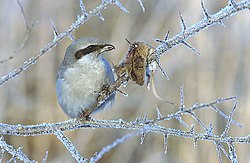
依據摄入與消耗有機質的形式,動物可分作數個不同的生态類群:肉食動物、植食动物、雜食動物、食腐动物/食碎屑動物[37]以及寄生動物[38],不同類群動物間的互動形成複雜的食物網。肉食動物與雜食動物具有捕食行為,為一種消費者-資源相互作用,指的是這些動物以其他動物(稱為獵物)為食[39]。捕食的行為也导致了掠食者與獵物之間的演化軍備競賽,使獵物產生反捕食者適應[40][41]。多細胞掠食者几乎都是動物[42]。部分消費者的食性不止一种,例如寄生蜂的幼蟲就主要以寄主的身體組織為食,並最終殺死寄主[43];但成蟲則主要以花蜜為食[44]。其他動物的進食行為可以非常專一,例如玳瑁就幾乎只食用海绵[45]。

大多數的動物仰賴植物光合作用所產生的生物質與能量,其中草食動物會直接取食植物,而位於較高營養級的肉食動物則透過食用其他動物獲得能量。動物必須透過氧化醣類、脂類及蛋白質等生物分子獲取氧分子的化學能[46],這些能量能協助動物成長並維持必要的生物過程(如運動)[47][48][49]。棲息於深海海床上的海底熱泉及冷泉附近的動物則仰賴能進行化能合成(透過氧化無機物,如硫化氫等來獲得能量)的古菌與細菌維生[50]。
動物最早起源於海洋,節肢動物與有胚植物約同時於芙蓉世至奥陶纪早期(5.10亿-4.71亿年前)登陸[51]。脊椎動物,例如肉鳍魚綱的提塔利克魚屬,則約於3.75亿年前的泥盆纪晚期登陸[52][53]。現存動物幾乎可在地球上的任何棲息地與微棲息地中被發現,包括鹹水、海底熱泉、淡水、溫泉、沼澤、森林、草原、沙漠、空中,甚至是其他動物、植物、真菌體內或岩石內[54]。然而動物並非嗜熱生物,僅有極少數物種能適應超過50 °C(122 °F)的高溫[55]。此外,也僅有極少數物種(多為線蟲)能棲息於南極洲極低溫的寒漠之中[56]。水熊蟲甚至能在外太空生活,直到太陽照射。
多样性
[编辑]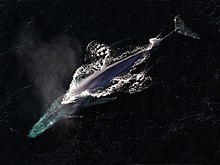
体型
[编辑]蓝鲸是地球上存在過的最大的動物,重可近200公噸(200長噸;220短噸),長33米(108英尺)[57][58][59],現存最大的陸生動物是非洲草原象,重可達12.25公噸(12.06長噸;13.50短噸)[57],体長10.67米(35.0英尺)[57]。不過實際上地球上還存在過比非洲草原象更大的陸生動物。蜥腳下目的阿根廷龍屬恐龍最重可達73公噸(72長噸;80短噸)[60]。 相對的,一些黏體動物(刺胞动物门的專性寄生物)最大也超不过20微米[61],其中最小的碘泡蟲在成年时体长甚至不到8.5微米[62]。
数量与分布
[编辑]以下列出現存物種数量最多的幾個动物門[63]以及它们的栖息地和生活习性[64][65][66]。下表的数据是基于人们迄今为止描述过的物种数量的估算,但实际数量因各文献采用的不同估算方法而有很大出入。例如,虽然现在科学家已描述了25,000至27,000种线虫类生物,但线虫的实际数量目前仍未有定论,估测实际数量有1万-2万、50万、1000万甚至1亿不等。[67]。截至2011年[update],依照生物分类结构所展示出来的规律,人们估算地球上可能共有777万种动物[68][69][a]。
| 门 | 图例 | 物种 数量 | 陆地 | 海洋 | 淡水 | 自由 活动 | 寄生 |
|---|---|---|---|---|---|---|---|
| 环节动物 |  | 17,000[63] | 是(分布于土壤中)[65] | 是[65] | 1,750[64] | 是 | 400[66] |
| 节肢动物 |  | 1,257,000[63] | 1,000,000 (昆虫纲)[73] | >40,000 (软甲纲)[74] | 94,000[64] | 是[65] | >45,000[b][66] |
| 外肛动物 |  | 6,000[63] | 是[65] | 60–80[64] | 是 | ||
| 脊索动物 |  | 66,000[63][75] 45,000[76] | 33,278[75] 23,000[76] | 13,000[76] | 18,000[64] 9,000[76] | 是 | 40(部分鲇形目)[77][66] |
| 刺胞動物 |  | 16,000[63] | 是[65] | 是(少数物种)[65] | 是[65] | >1,350 (黏体动物)[66] | |
| 棘皮动物 |  | 7,500[63] | 7,500[63] | 是[65] | |||
| 软体动物 |  | 85,000[63] 107,000[78] | 35,000[78] | 60,000[78] | 5,000[64] 12,000[78] | 是[65] | >5,600[66] |
| 线虫动物 |  | 25,000[63] | 是(分布于土壤中)[65] | 4,000[67] | 2,000[64] | 11,000[67] | 14,000[67] |
| 扁形动物 |  | 29,500[63] | 是[79] | 是[65] | 1,300[64] | 是[65] 3,000–6,500[80] | >40,000[66] 4,000–25,000[80] |
| 轮形动物 |  | 2,000[63] | >400[81] | 2,000[64] | 是 | ||
| 多孔动物 |  | 10,800[63] | 是[65] | 200-300[64] | 是 | 是[82] | |
| 已描述的动物物种数量总计(2013年): 1,525,728[63] | |||||||
起源和化石记录
[编辑]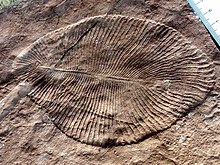
已知最早的动物化石出土于南澳大利亚州特雷佐纳组6.65亿年前的岩层,一般認為這些化石是当代多孔動物門的雏形[84]。
而已知最早的動物化石集群出现在前寒武紀末期的埃迪卡拉生物群(5.80亿至5.42亿年前)。对于埃迪卡拉生物群是否屬於動物长期存在著爭議[85][86][87],直到狄更遜水母化石中所發現的動物性脂質膽固醇證明了牠們確實屬於動物[83]。科学家认为動物起源於低含氧量的環境,且能夠進行無氧呼吸,但它们之後逐漸演化為有氧呼吸生物,需要環境中的氧氣来维持生存[88]。
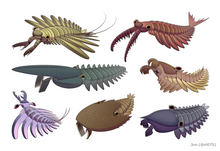
許多動物门类的化石紀錄出土于寒武纪大爆发的岩层,这段时期从5.42亿年前开始,并持续了2500万年左右[89]。其中,加拿大的伯吉斯頁岩及中國的澂江化石地是著名的化石發現地點,此二地出土的動物化石包含软体动物門、腕足动物门、有爪动物门、鰓曳動物門、缓步动物门、节肢动物門、棘皮动物門與半索动物门等類群,亦有如古杯动物、古蟲動物和三叶虫等已滅絕的動物。不过“大爆發”也有可能仅仅代表化石產地有大量的化石產出,而非大部分的動物均於同一時間演化出現[90][91][92][93]。
部分古生物學家認為動物在10億年前就已出现,远远早於寒武紀大爆發年代[94]。於拉伸纪地层發現的爬行痕跡與地穴的遗迹化石顯示,當時可能存在有三胚層的蠕蟲型動物,寬度為5毫米(0.20英寸),外型約近似於現存的蚯蚓[95]。然而,现今的巨型單細胞原生生物圓球網足蟲也能產生類似的痕跡,因此拉伸纪的化石痕跡很可能與早期的動物演化無關[96][97]。科学家約於同一地層年代发现了一些化石證據,或可证明食草动物的出现——由微生物菌落堆疊而成的疊層石的种类減少,可能是動物的牧食造成的[98]。
系统发育学
[编辑]动物界是一个单系群,有着共同的祖先。它和领鞭毛虫有亲缘关系,都属于聚胞动物[99]。其基群為多孔动物门、栉板动物门、刺胞動物門和扁盘动物门,这些门类的动物身體左右不對稱。這些分類之間的關係還存在爭議——多孔動物門或栉板动物门可能是所有其他動物分類的姐妹群,它們都缺乏身體構造形成中重要的Hox基因[100]。這些基因在扁盘动物门[101][102]和更高等的兩側對稱動物體內均有出现[103][104]。
現已發現有6331組現存動物共同的基因,这些基因可能全部出自6.5億年前的一个共同祖先。其中有25組是核心基因组,僅見於動物體內,当中有8組與Wnt和TGF-β信号通路相關,這些信息傳導途徑可以影響生物體的體軸發育,很可能是動物體能從單細胞生物脫胎成為多細胞生物的關鍵。另外還有7組為同源框蛋白等發育調控蛋白的转录因子[105][106]。
以下列出主要演化支的系統發生樹,并给出由分子钟推测的各支分化大概年份[107][108][109][110][111]。
| 聚胞动物 |
| ||||||||||||||||||||||||||||||||||||||||||||||||||||||||||||||||||||||||||||||||||||||||||||||||||||||||||||||||||||||||||||||||||||
| 9.5亿年前 |
非两侧对称
[编辑]
非兩側對稱動物描述的是缺乏兩側對稱性的動物類群,包含多孔動物門(如海綿等)、櫛板動物門(櫛水母)、扁盤動物門(如絲盤蟲等)[112][113],以及刺胞動物門(如水母、海葵及珊瑚等)等等。多孔動物門缺乏其他绝大多数動物門所具有的複雜器官或系統[114],雖然海綿的細胞有分化现象,但未形成組織和器官[115]。海綿大多依靠海水流過體表的小孔來獲得食物和氧氣,並排除廢物[116]。櫛板動物門和刺胞動物門解剖上呈輻射對稱,因此早期的文獻稱其為輻射對稱動物(Radiata)[117],但近年來的文獻已較少使用。這兩個門的動物具有分化的組織,但尚未形成器官[118]。它们屬於雙胚層動物,僅具有外胚層與內胚層,不具有中胚層[119]。体型较小的扁盤動物情况类似,但它们没有永久性的消化腔[112][113]。
傳統的生物學認為,原始的動物缺乏對稱性,因此認為無對稱性的多孔動物門是最古老的演化支[117][120]。其後出現的是輻射對稱動物,之後才發展出兩側對稱動物[117]。然而,這樣的觀點在近年來卻不斷受到挑戰[121]。有些學者根據分子遺傳研究,認為櫛板動物門才是最基群的動物演化支[121][122]。若然如此,動物對稱性的起源將比傳統認知的更加複雜,代表海綿喪失對稱性是次級性的[121]。目前兩個假說之間的爭論仍持續當中。
两侧对称
[编辑]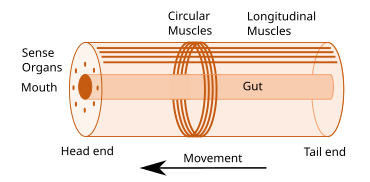
剩下的是占绝大多数的两侧对称动物,其下共计28个门,拥有超过100万个物种。其身体有三胚层,组织可分化为不同的器官。消化室有口、肛两个开口,其中部则发育为体腔或假体腔。这些具有两侧对称身体模式、倾向于朝特定方向运动的动物可以区分前端(头部)、后端(尾部),以及背侧、腹侧,因此也有左右两侧之分[123][124]。
动物的前端可以受到食物等外部刺激,并由此产生頭部專化現象,演化出长有感官、口的头部。许多两侧对称动物拥有环绕身躯的肌肉群,可用来束缚身体;以及与之交错的纵向肌群,可缩短体型[124]。这些肌群使得长有静水骨骼的软体动物以蠕动的方式来移动[125]。它们的消化道从口部沿着柱状的身躯一直通向肛门。两侧对称动物有不少门的初期幼虫可利用纖毛四处游动,其顶器长有感觉细胞。不过,这些规律也有些偶发的意外,比如成年棘皮动物体型呈辐射对称,和其幼体大相径庭;一些寄生虫的身体结构则极为简单[123][124]。
基因学研究扭转了动物学家对各两侧对称动物之间关系的认知,大部分转变集中在原口动物和後口動物这两个大演化支上[126]。通过基因分析,人们还了解到異無腔動物是两侧对称动物的基群[127][128][129]。
原口动物和后口动物
[编辑]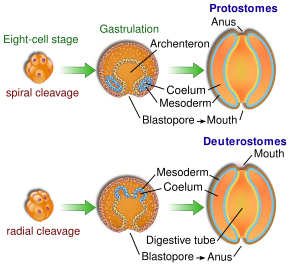
在剛開始發育時,後口動物的囊胚會進行輻射卵裂,而大多數的原口動物(又稱螺旋動物)則進行螺旋卵裂(又稱不定卵裂)[130]。原口動物與後口動物均有完整的消化道,但原口動物原腸最初的胚孔最後會发育為口,之後另一端才會形成肛門;而後口動物最初的胚孔則是发育為肛門,之後另一端發展為口,也因此得名[131][132]。大多數的原口動物透過裂體腔法形成中胚層與體腔,於原口兩側,內胚層與外胚層的交界處會有細胞分裂深入到內外胚層之間,這些細胞稱為中胚層細胞,發展為中胚層後在中胚層之間的空腔即稱為體腔。後口動物則透過腸體腔法形成中胚層,由內胚層兩側的細胞內凹,形成成對的腔腸囊,和內胚層脫離後,在內外胚層之間的腔腸囊就會發展為中胚層[133]。
棘皮動物門和脊索動物門為後口動物[134],棘皮動物門只在水中生活,包括海星、海膽與海參[135]。脊索動物門中大多動物為脊椎动物[136],包括魚類、两栖动物、爬行动物、鳥類及哺乳動物[137]。其他後口動物則包括半索动物门[138][139]。
蜕皮动物
[编辑]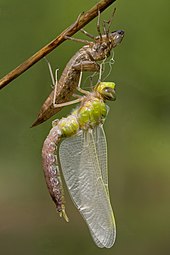
蛻皮動物是原口动物,一如其名,牠們必須透過蛻皮成長[140]。蜕皮动物包括了最大的動物門節肢動物門,包括昆蟲、蜘蛛、螃蟹等,這些动物的身體均有分節,且多具有成對的附肢。另外兩個較小的門,有爪动物门及缓步动物门,為節肢動物的近親並具有相似的特徵。蛻皮動物也包括線蟲動物門,可能為第二大的動物門。線蟲多半僅可於顯微鏡下可見,棲息於幾乎所有含水的生態系[141],部分物種為常見的寄生蟲[142]。線蟲動物門的近親包括线形虫动物门、动吻动物门、鳃曳动物门及铠甲动物门。線蟲與這些近親物種的體腔不具有體腔膜,又稱為假體腔[143]。
螺旋动物
[编辑]
螺旋动物是原口动物下的一个大类,在胚胎早期阶段以“螺旋式”卵裂进行发育[144]。关于螺旋动物的系统发育仍存在一定争议,但目前认为它包含了一个大演化支——冠輪動物总门,以及一些更小的门,如扁蟲動物(包括腹毛动物和扁形动物)。这些分类都属于扁虫冠轮动物。扁虫冠轮动物拥有姐妹群有颚动物,该分类下包含轮形动物[145][146]。
冠轮动物下属的分类有软体动物门、环节动物门、腕足动物门、纽形动物门、外肛动物门和内肛动物门[145][147][148]。其中,软体动物门是动物界的第二大门,包括蜗牛、蛤蜊及管魷等,而环节动物则由分节动物组成,包括蚯蚓、沙蠋及蚂蟥等。这两组动物被认为是近亲,因为它们在幼虫阶段都呈现担轮幼虫的形态[149][150]。
分类史
[编辑]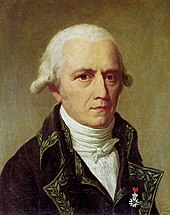
在古典时代,亚里士多德在《动物志》和《论动物的组成》中把动物分为有血的(脊椎动物一般有血)和没有血的。然后将动物通过一种分类尺度进行排列,从人(有血液,两足,理性灵魂)向下到有生命的四肢动物(有血液,四足,感性灵魂)再到其它分类群如甲壳类动物(无血,多足,感性灵魂)再向下到像海绵那样自然发生的生物(无血,无腿,植物灵魂)。亚里士多德不能确定海绵是否是动物,在他的分类系统中动物应该有感觉、食欲、能运动,而植物就没有:他知道海绵可以感应到触摸,如果将其从所在的岩石上拉下来时它就会收缩,但它们像植物那样会扎根,不会来回移动[152]。
在1758年,卡尔·林奈在他的《自然系統》创建了第一个分级分类[153]。在他一开始的计划中,动物是三个域中的一个,分为蠕虫类、昆虫类、鱼类、两栖类、鸟类和哺乳类。后来,人们将后四种都被归入脊索动物门一个门,而昆虫类(包括甲壳类和蛛型动物)和蠕虫类都被重新命名或再细分。让-巴蒂斯特·拉马克在1793年开始将动物重新分类,他称蠕虫类“非常混乱”(法語:une espèce de chaos[d]),将其拆成三个新门类:蠕虫类、棘皮类和水螅类(包含珊瑚和水母)。1809年,拉马克在《动物哲学》中将动物分为11类:脊椎动物(这部分他仍然下分为4类:哺乳类、鸟类、爬行类和鱼类)、软体动物、蔓足类、环节动物类、甲壳类、蛛型类、昆虫类、蠕虫类、放射虫类、水螅类和纤毛虫类[151]。
在喬治·居維葉于1817年所著的《动物界》里,他从比較解剖學的角度将动物分为四个分支(embranchements,其有不同的形态学所有体型,大致相当于门),即脊椎动物、软体动物、有绞动物(节肢动物和环节动物)和植物型动物(居维叶称作“放射虫”,包含棘皮动物、刺胞动物和其它形式)[155]。这种划分成四类的方式后来得到过胚胎学家卡尔·恩斯特·冯·贝尔(1828年)、动物学家路易斯·阿加西(1857年)和比较解剖学家理查德·欧文(在1860年)的完善[156]。
1874年,恩斯特·海克尔将动物界分为两个亚界:后生动物(多细胞动物,有五个门类:腔肠动物、棘皮动物、有绞动物、软体动物及脊椎动物)和原生动物(单细胞动物),此外他还将海绵划为第六个动物门类[157][156]。后来,原生动物被移到以前的原生生物界,只留下后生动物作为动物界的代名词[158]。
对人类的作用和影响
[编辑]
人类以许多其他动物物种作为食物,包括畜牧业中经过驯养的家畜,以及捕猎的野生动物(主要是通过在海中捕捞各种海鱼)[159][160]。商业捕捞海鱼的物种数量繁多,而相较之下商业养殖动物的物种数量较少[159][161][162]。此外,人类还会猎杀或养殖头足类、甲壳类、双壳类及腹足类等无脊椎动物作为食物[163]。世界各地都在饲养鸡、牛、羊及猪等动物作为食物[160][164][165]。动物纤维(如羊毛)可用于制造纺织品,动物筋腱能用于绑扎,皮被广泛用于制作鞋子等物品。人们猎捕或养殖动物获取它们的毛皮,用来制作大衣和帽子之类的物品[166][167],甚至昆虫也可用来制作染料(例如胭脂红[168][169][170][171]和蟲膠[172][173])。
黑腹果蝇等动物作为模式生物在科学实验中发挥了重要作用[174][175][176][177]。自18世纪发现疫苗开始,人们就将动物用于制造疫苗[178]。某些药物(例如以海鞘提取物製成的抗癌药物曲贝替定)就是基于源自动物的毒素等生物分子制成的[179]。

人们用猎犬追赶和寻回猎物[180],用猛禽来捕获鸟类和哺乳动物[181],用拴住喉咙的鸬鹚进行捕鱼[182]。箭毒蛙用来给吹管飞镖的尖端上毒[183][184]。从农业发展的初期开始,牛和马等动物就一直被用于劳作和运输[185]。各种各样的动物被当作宠物饲养,从无脊椎动物(特別是昆蟲和狼蛛[186])到爬行动物[187]再到鸟类[188]。但是,最常见的宠物,如狗、猫及兔子等等,属于哺乳动物[189][190][191]。人们还喜欢进行动物相关的体育运动(如马术)[192]。不过,在动物作为与人类相关的角色与動物權利的个体自由而存在着矛盾[193]。

从古至今,动物都是艺术的题材,在史前時代的許多壁畫中即有不少動物圖繪[194],其中年代最早者至少可回溯至4萬3900年前的舊石器時代晚期[195]。著名的动物画作包括阿尔布雷希特·丢勒在1515年画的《丢勒的犀牛》和乔治·斯塔布斯约1762年画的《枣红马》[196]。动物还经常在文学作品和电影中扮演重要角色[197],在神话和宗教中也有出现(如《梁山伯与祝英台》)[198][199]。在日本和欧洲,蝴蝶被视为人类灵魂的化身[198][200][201]。圣甲虫在古埃及是一种神圣的动物[202]。在哺乳动物中,牛[203]、鹿[199]、马[204]、狮子[205]、蝙蝠[206]、熊[207]和狼[208]都曾在神话中出现,是人类崇拜的对象。西方的黄道带和中国的十二生肖也是基于动物而创造的传说[209][210]。世界上有多個國家和地區選擇象徵國家和民族精神的動物,即為國獸。
注解
[编辑]另见
[编辑]参考资料
[编辑]- 如无特殊说明以下参考资料均为英语来源
- ^ Cresswell, Julia. The Oxford Dictionary of Word Origins 2nd. New York: Oxford University Press. 2010. ISBN 978-0-19-954793-7.
'having the breath of life', from anima 'air, breath, life'.
- ^ Animal. The American Heritage Dictionary 4th. Houghton Mifflin Company. 2006.
- ^ animal. English Oxford Living Dictionaries. [2018-07-26]. (原始内容存档于2018-07-26).
- ^ Boly, Melanie; Seth, Anil K.; Wilke, Melanie; Ingmundson, Paul; Baars, Bernard; Laureys, Steven; Edelman, David; Tsuchiya, Naotsugu. Consciousness in humans and non-human animals: recent advances and future directions. Frontiers in Psychology. 2013, 4: 625. ISSN 1664-1078. PMC 3814086
 . PMID 24198791. doi:10.3389/fpsyg.2013.00625.
. PMID 24198791. doi:10.3389/fpsyg.2013.00625. - ^ The use of non-human animals in research. Royal Society. [2018-06-07]. (原始内容存档于2018-06-12).
- ^ Nonhuman definition and meaning |. Collins English Dictionary. [2018-06-07]. (原始内容存档于2018-06-12).
- ^ Avila, Vernon L. Biology: Investigating Life on Earth. Jones & Bartlett Learning. 1995: 767–. ISBN 978-0-86720-942-6.
- ^ 8.0 8.1 Palaeos:Metazoa. Palaeos. [2018-02-25]. (原始内容存档于2018-02-28).
- ^ Bergman, Jennifer. Heterotrophs. [2007-09-30]. (原始内容存档于2007-08-29).
- ^ Douglas, Angela E.; Raven, John A. Genomes at the interface between bacteria and organelles. Philosophical Transactions of the Royal Society B. 2003-01, 358 (1429): 5–17. PMC 1693093
 . PMID 12594915. doi:10.1098/rstb.2002.1188.
. PMID 12594915. doi:10.1098/rstb.2002.1188. - ^ Mentel, Marek; Martin, William. Anaerobic animals from an ancient, anoxic ecological niche. BMC Biology. 2010, 8: 32. PMC 2859860
 . PMID 20370917. doi:10.1186/1741-7007-8-32.
. PMID 20370917. doi:10.1186/1741-7007-8-32. - ^ Davidson, Michael W. Animal Cell Structure. [2007-09-20]. (原始内容存档于2007-09-20).
- ^ Saupe, S.G. Concepts of Biology. [2007-09-30]. (原始内容存档于2007-11-21).
- ^ Minkoff, Eli C. Barron's EZ-101 Study Keys Series: Biology 2nd, revised. Barron's Educational Series. 2008: 48. ISBN 978-0-7641-3920-8.
- ^ Winograd, Claudia. Germ layer | biology. Encyclopedia Britannica. 大英百科全书. [2020-05-25]. (原始内容存档于2021-12-21).
- ^ Alberts, Bruce; Johnson, Alexander; Lewis, Julian; Raff, Martin; Roberts, Keith; Walter, Peter. Molecular Biology of the Cell 4th. Garland Science. 2002 [2017-08-29]. ISBN 978-0-8153-3218-3. (原始内容存档于2016-12-23).
- ^ Sangwal, Keshra. Additives and crystallization processes: from fundamentals to applications. John Wiley and Sons. 2007: 212. ISBN 978-0-470-06153-4.
- ^ Becker, Wayne M. The world of the cell. Benjamin/Cummings. 1991. ISBN 978-0-8053-0870-9.
- ^ Magloire, Kim. Cracking the AP Biology Exam, 2004–2005 Edition. The Princeton Review. 2004: 45. ISBN 978-0-375-76393-9.
- ^ Starr, Cecie. Biology: Concepts and Applications without Physiology. Cengage Learning. 2007-09-25: 362, 365. ISBN 978-0-495-38150-1.
- ^ Hillmer, Gero; Lehmann, Ulrich. Fossil Invertebrates. Translated by J. Lettau. CUP Archive. 1983: 54 [2016-01-08]. ISBN 978-0-521-27028-1. (原始内容存档于2016-05-07).
- ^ Knobil, Ernst. Encyclopedia of reproduction, Volume 1. Academic Press. 1998: 315. ISBN 978-0-12-227020-8.
- ^ Schwartz, Jill. Master the GED 2011. Peterson's. 2010: 371. ISBN 978-0-7689-2885-3.
- ^ Hamilton, Matthew B. Population genetics. Wiley-Blackwell. 2009: 55. ISBN 978-1-4051-3277-0.
- ^ Ville, Claude Alvin; Walker, Warren Franklin; Barnes, Robert D. General zoology. Saunders College Pub. 1984: 467. ISBN 978-0-03-062451-3.
- ^ Hamilton, William James; Boyd, James Dixon; Mossman, Harland Winfield. Human embryology: (prenatal development of form and function). Williams & Wilkins. 1945: 330.
- ^ Philips, Joy B. Development of vertebrate anatomy. Mosby. 1975: 176. ISBN 978-0-8016-3927-2.
- ^ The Encyclopedia Americana: a library of universal knowledge, Volume 10. Encyclopedia Americana Corp. 1918: 281.
- ^ Romoser, William S.; Stoffolano, J.G. The science of entomology. WCB McGraw-Hill. 1998: 156. ISBN 978-0-697-22848-2.
- ^ Charlesworth, D.; Willis, J.H. The genetics of inbreeding depression. Nat. Rev. Genet. 2009, 10 (11): 783–796. PMID 19834483. doi:10.1038/nrg2664.
- ^ Bernstein, H.; Hopf, F.A.; Michod, R.E. The molecular basis of the evolution of sex. Adv. Genet. Advances in Genetics. 1987, 24: 323–370. ISBN 978-0-12-017624-3. PMID 3324702. doi:10.1016/s0065-2660(08)60012-7.
- ^ Pusey, Anne; Wolf, Marisa. Inbreeding avoidance in animals. Trends Ecol. Evol. 1996, 11 (5): 201–206. PMID 21237809. doi:10.1016/0169-5347(96)10028-8.
- ^ Petrie, M.; Kempenaers, B. Extra-pair paternity in birds: Explaining variation between species and populations. Trends in Ecology and Evolution. 1998, 13 (2): 52–57. PMID 21238200. doi:10.1016/s0169-5347(97)01232-9.
- ^ FRANKHAM, RICHARD; BALLOU, JONATHAN D.; ELDRIDGE, MARK D. B.; LACY, ROBERT C.; RALLS, KATHERINE; DUDASH, MICHELE R.; FENSTER, CHARLES B. Predicting the Probability of Outbreeding Depression. Conservation Biology. 2011-04-12, 25 (3): 465–475. ISSN 0888-8892. PMID 21486369. doi:10.1111/j.1523-1739.2011.01662.x.
- ^ Adiyodi, K.G.; Hughes, Roger N.; Adiyodi, Rita G. Reproductive Biology of Invertebrates, Volume 11, Progress in Asexual Reproduction. Wiley. 2002-07: 116. ISBN 978-0-471-48968-9.
- ^ Schatz, Phil. Concepts of Biology | How Animals Reproduce. OpenStax College. [2018-03-05]. (原始内容存档于2018-03-06).
- ^ Marchetti, Mauro; Rivas, Victoria. Geomorphology and environmental impact assessment. Taylor & Francis. 2001: 84. ISBN 978-90-5809-344-8.
- ^ Levy, Charles K. Elements of Biology. Appleton-Century-Crofts. 1973: 108. ISBN 978-0-390-55627-1.
- ^ Begon, M.; Townsend, C.; Harper, J. Ecology: Individuals, populations and communities Third. Blackwell Science. 1996. ISBN 978-0-86542-845-4.
- ^ Allen, Larry Glen; Pondella, Daniel J.; Horn, Michael H. Ecology of marine fishes: California and adjacent waters. University of California Press. 2006: 428. ISBN 978-0-520-24653-9.
- ^ Caro, Tim. Antipredator Defenses in Birds and Mammals. University of Chicago Press. 2005: 1–6 and passim.
- ^ Simpson, Alastair G.B; Roger, Andrew J. The real 'kingdoms' of eukaryotes. Current Biology. 2004, 14 (17): R693–696. PMID 15341755. doi:10.1016/j.cub.2004.08.038.
- ^ Stevens, Alison N.P. Predation, Herbivory, and Parasitism. Nature Education Knowledge. 2010, 3 (10): 36 [2018-02-12]. (原始内容存档于2017-09-30).
- ^ Jervis, M.A.; Kidd, N.A.C. Host-Feeding Strategies in Hymenopteran Parasitoids. Biological Reviews. 1986-11, 61 (4): 395–434. doi:10.1111/j.1469-185x.1986.tb00660.x.
- ^ Meylan, Anne. Spongivory in Hawksbill Turtles: A Diet of Glass. Science. 1988-01-22, 239 (4838): 393–395. Bibcode:1988Sci...239..393M. JSTOR 1700236. PMID 17836872. doi:10.1126/science.239.4838.393.
- ^ Schmidt-Rohr, Klaus. Oxygen Is the High-Energy Molecule Powering Complex Multicellular Life: Fundamental Corrections to Traditional Bioenergetics. 美国化学会Omega. 2020-01-28, 5 (5): 2221–2233. doi:10.1021/acsomega.9b03352.
- ^ Clutterbuck, Peter. Understanding Science: Upper Primary. Blake Education. 2000: 9. ISBN 978-1-86509-170-9.
- ^ Gupta, P.K. Genetics Classical To Modern. Rastogi Publications. 1900: 26. ISBN 978-81-7133-896-2.
- ^ Garrett, Reginald; Grisham, Charles M. Biochemistry. Cengage Learning. 2010: 535. ISBN 978-0-495-10935-8.
- ^ Castro, Peter; Huber, Michael E. Marine Biology 7th. McGraw-Hill. 2007: 376. ISBN 978-0-07-722124-9.
- ^ Rota-Stabelli, Omar; Daley, Allison C.; Pisani, Davide. Molecular Timetrees Reveal a Cambrian Colonization of Land and a New Scenario for Ecdysozoan Evolution. Current Biology. 2013, 23 (5): 392–8. PMID 23375891. doi:10.1016/j.cub.2013.01.026.
- ^ Daeschler, Edward B.; Shubin, Neil H.; Jenkins, Farish A., Jr. A Devonian tetrapod-like fish and the evolution of the tetrapod body plan. Nature. 2006-04-06, 440 (7085): 757–763. Bibcode:2006Natur.440..757D. PMID 16598249. doi:10.1038/nature04639.
- ^ Clack, Jennifer A. Getting a Leg Up on Land. Scientific American. 2005-11-21, 293 (6): 100–7. Bibcode:2005SciAm.293f.100C. PMID 16323697. doi:10.1038/scientificamerican1205-100.
- ^ Margulis, Lynn; Schwartz, Karlene V.; Dolan, Michael. Diversity of Life: The Illustrated Guide to the Five Kingdoms. Jones & Bartlett Learning. 1999: 115–116. ISBN 978-0-7637-0862-7.
- ^ Clarke, Andrew. The thermal limits to life on Earth (PDF). International Journal of Astrobiology. 2014, 13 (2): 141–154 [2018-11-15]. Bibcode:2014IJAsB..13..141C. doi:10.1017/S1473550413000438. (原始内容存档 (PDF)于2019-04-24).
- ^ Land animals. British Antarctic Survey. [2018-03-07]. (原始内容存档于2018-11-06).
- ^ 57.0 57.1 57.2 Wood, Gerald. The Guinness Book of Animal Facts and Feats. Enfield, Middlesex : Guinness Superlatives. 1983. ISBN 978-0-85112-235-9.
- ^ Davies, Ella. The longest animal alive may be one you never thought of. BBC Earth. 2016-04-20 [2018-03-01]. (原始内容存档于2018-03-19).
- ^ Largest mammal. Guinness World Records. [2018-03-01]. (原始内容存档于2018-01-31).
- ^ Mazzetta, Gerardo V.; Christiansen, Per; Fariña, Richard A. Giants and Bizarres: Body Size of Some Southern South American Cretaceous Dinosaurs. Historical Biology. 2004, 16 (2–4): 71–83. doi:10.1080/08912960410001715132.
- ^ Fiala, Ivan. Myxozoa. Tree of Life Web Project. 2008-07-10 [2018-03-04]. (原始内容存档于2018-03-01).
- ^ Kaur, H.; Singh, R. Two new species of Myxobolus (Myxozoa: Myxosporea: Bivalvulida) infecting an Indian major carp and a cat fish in wetlands of Punjab, India. Journal of Parasitic Diseases. 2011, 35 (2): 169–176. PMC 3235390
 . PMID 23024499. doi:10.1007/s12639-011-0061-4.
. PMID 23024499. doi:10.1007/s12639-011-0061-4. - ^ 63.00 63.01 63.02 63.03 63.04 63.05 63.06 63.07 63.08 63.09 63.10 63.11 63.12 63.13 Zhang, Zhi-Qiang. Animal biodiversity: An update of classification and diversity in 2013. In: Zhang, Z.-Q. (Ed.) Animal Biodiversity: An Outline of Higher-level Classification and Survey of Taxonomic Richness (Addenda 2013). Zootaxa. 2013-08-30, 3703 (1): 5 [2018-03-02]. doi:10.11646/zootaxa.3703.1.3. (原始内容存档于2019-04-24).
- ^ 64.00 64.01 64.02 64.03 64.04 64.05 64.06 64.07 64.08 64.09 Balian, E.V.; Lévêque, C.; Segers, H.; Martens, K. Freshwater Animal Diversity Assessment. Springer. 2008: 628. ISBN 978-1-4020-8259-7.
- ^ 65.00 65.01 65.02 65.03 65.04 65.05 65.06 65.07 65.08 65.09 65.10 65.11 65.12 65.13 Hogenboom, Melissa. There are only 35 kinds of animal and most are really weird. BBC earth. [2018-03-02]. (原始内容存档于2018-08-10).
- ^ 66.0 66.1 66.2 66.3 66.4 66.5 66.6 66.7 Poulin, Robert. Evolutionary Ecology of Parasites. Princeton University Press. 2007: 6. ISBN 978-0-691-12085-0.
- ^ 67.0 67.1 67.2 67.3 Felder, Darryl L.; Camp, David K. Gulf of Mexico Origin, Waters, and Biota: Biodiversity. Texas A&M University Press. 2009: 1111. ISBN 978-1-60344-269-5.
- ^ How many species on Earth? About 8.7 million, new estimate says. 2011-08-24 [2018-03-02]. (原始内容存档于2018-07-01).
- ^ Mora, Camilo; Tittensor, Derek P.; Adl, Sina; Simpson, Alastair G.B.; Worm, Boris. Mace, Georgina M. , 编. How Many Species Are There on Earth and in the Ocean?. PLOS Biology. 2011-08-23, 9 (8): e1001127. PMC 3160336
 . PMID 21886479. doi:10.1371/journal.pbio.1001127.
. PMID 21886479. doi:10.1371/journal.pbio.1001127. - ^ Erwin, Terry L. Biodiversity at its utmost: Tropical Forest Beetles (PDF). 1997: 27–40 [2017-12-16]. (原始内容存档 (PDF)于2018-11-09). In: Reaka-Kudla, M.L.; Wilson, D.E.; Wilson, E.O. (编). Biodiversity II
 . Joseph Henry Press, Washington, D.C.
. Joseph Henry Press, Washington, D.C. - ^ Erwin, Terry L. Tropical forests: their richness in Coleoptera and other arthropod species (PDF). The Coleopterists Bulletin. 1982, 36: 74–75 [2018-09-16]. (原始内容存档 (PDF)于2015-09-23).
- ^ Hebert, Paul D.N.; Ratnasingham, Sujeevan; Zakharov, Evgeny V.; Telfer, Angela C.; Levesque-Beaudin, Valerie; Milton, Megan A.; Pedersen, Stephanie; Jannetta, Paul; deWaard, Jeremy R. Counting animal species with DNA barcodes: Canadian insects. Philosophical Transactions of the Royal Society B: Biological Sciences. 2016-08-01, 371 (1702): 20150333. PMC 4971185
 . PMID 27481785. doi:10.1098/rstb.2015.0333.
. PMID 27481785. doi:10.1098/rstb.2015.0333. - ^ Stork, Nigel E. How Many Species of Insects and Other Terrestrial Arthropods Are There on Earth?. Annual Review of Entomology. 2018-01, 63 (1): 31–45. PMID 28938083. doi:10.1146/annurev-ento-020117-043348. Stork notes that 1m insects have been named, making much larger predicted estimates.
- ^ Poore, Hugh F. Introduction. Crustacea: Malacostraca. Zoological catalogue of Australia 19.2A. CSIRO Publishing. 2002: 1–7. ISBN 978-0-643-06901-5.
- ^ 75.0 75.1 The World Conservation Union. 2014. IUCN Red List of Threatened Species, 2014.3. Summary Statistics for Globally Threatened Species. Table 1: Numbers of threatened species by major groups of organisms (1996–2014) (页面存档备份,存于互联网档案馆).
- ^ 76.0 76.1 76.2 76.3 Reaka-Kudla, Marjorie L.; Wilson, Don E.; Wilson, Edward O. Biodiversity II: Understanding and Protecting Our Biological Resources. Joseph Henry Press. 1996: 90. ISBN 978-0-309-52075-1.
- ^ Burton, Derek; Burton, Margaret. Essential Fish Biology: Diversity, Structure and Function. Oxford University Press. 2017: 281–282. ISBN 978-0-19-878555-2.
Trichomycteridae ... includes obligate parasitic fish. Thus 17 genera from 2 subfamilies, Vandelliinae; 4 genera, 9spp. and Stegophilinae; 13 genera, 31 spp. are parasites on gills (Vandelliinae) or skin (stegophilines) of fish.
- ^ 78.0 78.1 78.2 78.3 Nicol, David. The Number of Living Species of Molluscs. Systematic Zoology. 1969-06, 18 (2): 251–254. JSTOR 2412618. doi:10.2307/2412618.
- ^ Sluys, R. Global diversity of land planarians (Platyhelminthes, Tricladida, Terricola): a new indicator-taxon in biodiversity and conservation studies. Biodiversity and Conservation. 1999, 8 (12): 1663–1681. doi:10.1023/A:1008994925673.
- ^ 80.0 80.1 Pandian, T. J. Reproduction and Development in Platyhelminthes. CRC Press. 2020: 13–14 [2020-05-19]. ISBN 9781000054903. (原始内容存档于2021-11-14).
- ^ Fontaneto, Diego. Marine Rotifers | An Unexplored World of Richness (PDF). JMBA Global Marine Environment: 4–5. [2018-03-02]. (原始内容存档 (PDF)于2018-03-02).
- ^ Morand, Serge; Krasnov, Boris R.; Littlewood, D. Timothy J. Parasite Diversity and Diversification. Cambridge University Press. 2015: 44 [2018-03-02]. ISBN 978-1-107-03765-6. (原始内容存档于2018-12-12).
- ^ 83.0 83.1 Bobrovskiy, Ilya; Hope, Janet M.; Ivantsov, Andrey; Nettersheim, Benjamin J.; Hallmann, Christian; Brocks, Jochen J. Ancient steroids establish the Ediacaran fossil Dickinsonia as one of the earliest animals. Science. 2018-09-20, 361 (6408): 1246–1249. Bibcode:2018Sci...361.1246B. PMID 30237355. doi:10.1126/science.aat7228.
- ^ Maloof, Adam C.; Rose, Catherine V.; Beach, Robert; Samuels, Bradley M.; Calmet, Claire C.; Erwin, Douglas H.; Poirier, Gerald R.; Yao, Nan; Simons, Frederik J. Possible animal-body fossils in pre-Marinoan limestones from South Australia. Nature Geoscience. 2010-08-17, 3 (9): 653–659. Bibcode:2010NatGe...3..653M. doi:10.1038/ngeo934.
- ^ Shen, Bing; Dong, Lin; Xiao, Shuhai; Kowalewski, Michał. The Avalon Explosion: Evolution of Ediacara Morphospace. Science. 2008, 319 (5859): 81–84. Bibcode:2008Sci...319...81S. PMID 18174439. doi:10.1126/science.1150279.
- ^ Chen, Zhe; Chen, Xiang; Zhou, Chuanming; Yuan, Xunlai; Xiao, Shuhai. Late Ediacaran trackways produced by bilaterian animals with paired appendages. Science Advances. 2018-06-01, 4 (6): eaao6691. Bibcode:2018SciA....4.6691C. PMC 5990303
 . PMID 29881773. doi:10.1126/sciadv.aao6691.
. PMID 29881773. doi:10.1126/sciadv.aao6691. - ^ Schopf, J. William. Evolution!: facts and fallacies. Academic Press. 1999: 7. ISBN 978-0-12-628860-5.
- ^ Zimorski, Verena; Mentel, Marek; Tielens, Aloysius G.M.; Martin, William F. Energy metabolism in anaerobic eukaryotes and Earth's late oxygenation. Free Radical Biology and Medicine. 2019, 140: 279–294. PMC 6856725
 . PMID 30935869. doi:10.1016/j.freeradbiomed.2019.03.030.
. PMID 30935869. doi:10.1016/j.freeradbiomed.2019.03.030. - ^ Erwin, D. H.; Laflamme, M.; Tweedt, S. M.; Sperling, E. A.; Pisani, D.; Peterson, K. J. The Cambrian conundrum: early divergence and later ecological success in the early history of animals. Science. 2011, 334: 1091–1097. Bibcode:2011Sci...334.1091E. PMID 22116879. doi:10.1126/science.1206375.
- ^ Maloof, A.C.; Porter, S.M.; Moore, J.L.; Dudas, F.O.; Bowring, S.A.; Higgins, J.A.; Fike, D.A.; Eddy, M.P. The earliest Cambrian record of animals and ocean geochemical change. Geological Society of America Bulletin. 2010, 122 (11–12): 1731–1774. Bibcode:2010GSAB..122.1731M. doi:10.1130/B30346.1.
- ^ New Timeline for Appearances of Skeletal Animals in Fossil Record Developed by UCSB Researchers. The Regents of the University of California. 2010-11-10 [2014-09-01]. (原始内容存档于2014-09-03).
- ^ Conway-Morris, S. The Cambrian "explosion" of metazoans and molecular biology: would Darwin be satisfied?. The International Journal of Developmental Biology. 2003, 47 (7–8): 505–515 [2018-02-28]. PMID 14756326. (原始内容存档于2018-07-16).
- ^ The Tree of Life. The Burgess Shale. 皇家安大略博物館. 2011-06-10 [2018-02-28]. (原始内容存档于2018-02-16).
- ^ Campbell, Neil A.; Reece, Jane B. Biology 7th. Pearson, Benjamin Cummings. 2005: 526. ISBN 978-0-8053-7171-0.
- ^ Seilacher, Adolf; Bose, Pradip K.; Pfluger, Friedrich. Triploblastic animals more than 1 billion years ago: trace fossil evidence from india. Science. 1998-10-02, 282 (5386): 80–83. Bibcode:1998Sci...282...80S. PMID 9756480. doi:10.1126/science.282.5386.80.
- ^ Matz, Mikhail V.; Frank, Tamara M.; Marshall, N. Justin; Widder, Edith A.; Johnsen, Sönke. Giant Deep-Sea Protist Produces Bilaterian-like Traces (PDF). Current Biology. 2008-12-09, 18 (23): 1849–54 [2008-12-05]. PMID 19026540. doi:10.1016/j.cub.2008.10.028. (原始内容 (PDF)存档于2008-12-16).
- ^ Reilly, Michael. Single-celled giant upends early evolution. NBC News. 2008-11-20 [2008-12-05]. (原始内容存档于2013-03-29).
- ^ Bengtson, S. The fossil record of predation. Kowalewski, M.; Kelley, P.H. (编). The Paleontological Society Papers 8. The Paleontological Society: 289–317. 2002. (原始内容存档 (PDF)于2019-10-30) 使用
|archiveurl=需要含有|url=(帮助).|chapter=被忽略 (帮助); - ^ Budd, Graham E; Jensen, Sören. The origin of the animals and a 'Savannah' hypothesis for early bilaterian evolution. Biological Reviews. 2017, 92 (1): 446–473. PMID 26588818. doi:10.1111/brv.12239.
- ^ Giribet, Gonzalo. Genomics and the animal tree of life: conflicts and future prospects. Zoologica Scripta. 2016-09-27, 45: 14–21. doi:10.1111/zsc.12215.
- ^ Evolution and Development (PDF). Carnegie Institution for Science Department of Embryology: 38. 2012-05-01 [2018-03-04]. (原始内容 (PDF)存档于2014-03-02).
- ^ Dellaporta, Stephen; Holland, Peter; Schierwater, Bernd; Jakob, Wolfgang; Sagasser, Sven; Kuhn, Kerstin. The Trox-2 Hox/ParaHox gene of Trichoplax (Placozoa) marks an epithelial boundary. Development Genes and Evolution. 2004-04, 214 (4): 170–175. PMID 14997392. doi:10.1007/s00427-004-0390-8.
- ^ Peterson, Kevin J.; Eernisse, Douglas J. Animal phylogeny and the ancestry of bilaterians: Inferences from morphology and 18S rDNA gene sequences. Evolution and Development. 2001, 3 (3): 170–205. PMID 11440251. doi:10.1046/j.1525-142x.2001.003003170.x.
- ^ Kraemer-Eis, Andrea; Ferretti, Luca; Schiffer, Philipp; Heger, Peter; Wiehe, Thomas. A catalogue of Bilaterian-specific genes – their function and expression profiles in early development (PDF). bioRxiv. 2016 [2020-05-01]. doi:10.1101/041806. (原始内容存档 (PDF)于2018-02-26).
- ^ Zimmer, Carl. The Very First Animal Appeared Amid an Explosion of DNA. The New York Times. 2018-05-04 [2018-05-04]. (原始内容存档于2018-05-04).
- ^ Paps, Jordi; Holland, Peter W.H. Reconstruction of the ancestral metazoan genome reveals an increase in genomic novelty. 自然-通讯. 2018-04-30, 9 (1730 (2018)): 1730. Bibcode:2018NatCo...9.1730P. PMC 5928047
 . PMID 29712911. doi:10.1038/s41467-018-04136-5.
. PMID 29712911. doi:10.1038/s41467-018-04136-5. - ^ Peterson, Kevin J.; Cotton, James A.; Gehling, James G.; Pisani, Davide. The Ediacaran emergence of bilaterians: congruence between the genetic and the geological fossil records. Philosophical Transactions of the Royal Society of London B: Biological Sciences. 2008-04-27, 363 (1496): 1435–1443. PMC 2614224
 . PMID 18192191. doi:10.1098/rstb.2007.2233.
. PMID 18192191. doi:10.1098/rstb.2007.2233. - ^ Parfrey, Laura Wegener; Lahr, Daniel J.G.; Knoll, Andrew H.; Katz, Laura A. Estimating the timing of early eukaryotic diversification with multigene molecular clocks. Proceedings of the National Academy of Sciences. 2011-08-16, 108 (33): 13624–13629. Bibcode:2011PNAS..10813624P. PMC 3158185
 . PMID 21810989. doi:10.1073/pnas.1110633108.
. PMID 21810989. doi:10.1073/pnas.1110633108. - ^ Raising the Standard in Fossil Calibration. Fossil Calibration Database. [2018-03-03]. (原始内容存档于2018-03-07).
- ^ Laumer, Christopher E.; Gruber-Vodicka, Harald; Hadfield, Michael G.; Pearse, Vicki B.; Riesgo, Ana; Marioni, John C.; Giribet, Gonzalo. Support for a clade of Placozoa and Cnidaria in genes with minimal compositional bias. eLife. 2018, 2018;7: e36278. PMC 6277202
 . PMID 30373720. doi:10.7554/eLife.36278.
. PMID 30373720. doi:10.7554/eLife.36278. - ^ Adl, Sina M.; Bass, David; Lane, Christopher E.; Lukeš, Julius; Schoch, Conrad L.; Smirnov, Alexey; Agatha, Sabine; Berney, Cedric; Brown, Matthew W. Revisions to the Classification, Nomenclature, and Diversity of Eukaryotes. Journal of Eukaryotic Microbiology. 2018, 66 (1): 4–119. PMC 6492006
 . PMID 30257078. doi:10.1111/jeu.12691.
. PMID 30257078. doi:10.1111/jeu.12691. - ^ 112.0 112.1 Barnes, Robert D. Invertebrate Zoology. Holt-Saunders International. 1982: 84–85. ISBN 978-0-03-056747-6.
- ^ 113.0 113.1 Introduction to Placozoa. UCMP Berkeley. [2018-03-10]. (原始内容存档于2018-03-25).
- ^ Sumich, James L. Laboratory and Field Investigations in Marine Life. Jones & Bartlett Learning. 2008: 67. ISBN 978-0-7637-5730-4.
- ^ Jessop, Nancy Meyer. Biosphere; a study of life. Prentice-Hall. 1970: 428.
- ^ Sharma, N.S. Continuity And Evolution Of Animals. Mittal Publications. 2005: 106. ISBN 978-81-8293-018-6.
- ^ 117.0 117.1 117.2 Martindale, Mark Q; Finnerty, John R; Henry, Jonathan Q. The Radiata and the evolutionary origins of the bilaterian body plan. Molecular Phylogenetics and Evolution. 2002-09-01, 24 (3): 358–365. ISSN 1055-7903. doi:10.1016/S1055-7903(02)00208-7 (英语).
- ^ Safra, Jacob E. The New Encyclopædia Britannica, Volume 16. Encyclopædia Britannica. 2003: 523. ISBN 978-0-85229-961-6.
- ^ Kotpal, R.L. Modern Text Book of Zoology: Invertebrates. Rastogi Publications. 2012: 184. ISBN 978-81-7133-903-7.
- ^ Bhamrah, H.S.; Juneja, Kavita. An Introduction to Porifera. Anmol Publications. 2003: 58. ISBN 978-81-261-0675-2.
- ^ 121.0 121.1 121.2 Laumer, Christopher E.; Fernández, Rosa; Lemer, Sarah; Combosch, David; Kocot, Kevin M.; Riesgo, Ana; Andrade, Sónia C. S.; Sterrer, Wolfgang; Sørensen, Martin V. Revisiting metazoan phylogeny with genomic sampling of all phyla. Proceedings of the Royal Society B: Biological Sciences. 2019-07-10, 286 (1906): 20190831 [2020-06-18]. PMC 6650721
 . PMID 31288696. doi:10.1098/rspb.2019.0831. (原始内容存档于2021-09-16).
. PMID 31288696. doi:10.1098/rspb.2019.0831. (原始内容存档于2021-09-16). - ^ Whelan, Nathan V.; Kocot, Kevin M.; Moroz, Tatiana P.; Mukherjee, Krishanu; Williams, Peter; Paulay, Gustav; Moroz, Leonid L.; Halanych, Kenneth M. Ctenophore relationships and their placement as the sister group to all other animals. Nature Ecology & Evolution. 2017-11, 1 (11): 1737–1746 [2020-06-18]. ISSN 2397-334X. doi:10.1038/s41559-017-0331-3. (原始内容存档于2021-11-26) (英语).
- ^ 123.0 123.1 Minelli, Alessandro. Perspectives in Animal Phylogeny and Evolution. Oxford University Press. 2009: 53. ISBN 978-0-19-856620-5.
- ^ 124.0 124.1 124.2 Brusca, Richard C. Introduction to the Bilateria and the Phylum Xenacoelomorpha | Triploblasty and Bilateral Symmetry Provide New Avenues for Animal Radiation (PDF). Invertebrates (Sinauer Associates). 2016: 345–372 [2018-03-04]. ISBN 978-1-60535-375-3. (原始内容存档 (PDF)于2019-04-24).
- ^ Quillin, K.J. Ontogenetic scaling of hydrostatic skeletons: geometric, static stress and dynamic stress scaling of the earthworm lumbricus terrestris. The Journal of Experimental Biology. 1998-05, 201 (12): 1871–1883 [2020-05-01]. PMID 9600869. (原始内容存档于2020-06-17).
- ^ Telford, Maximilian J. Resolving Animal Phylogeny: A Sledgehammer for a Tough Nut?. Developmental Cell. 2008, 14 (4): 457–459. PMID 18410719. doi:10.1016/j.devcel.2008.03.016.
- ^ Philippe, H.; Brinkmann, H.; Copley, R.R.; Moroz, L.L.; Nakano, H.; Poustka, A.J.; Wallberg, A.; Peterson, K.J.; Telford, M.J. Acoelomorph flatworms are deuterostomes related to Xenoturbella. Nature. 2011, 470 (7333): 255–258. Bibcode:2011Natur.470..255P. PMC 4025995
 . PMID 21307940. doi:10.1038/nature09676.
. PMID 21307940. doi:10.1038/nature09676. - ^ Perseke, M.; Hankeln, T.; Weich, B.; Fritzsch, G.; Stadler, P.F.; Israelsson, O.; Bernhard, D.; Schlegel, M. The mitochondrial DNA of Xenoturbella bocki: genomic architecture and phylogenetic analysis (PDF). Theory Biosci. 2007-08, 126 (1): 35–42 [2018-03-04]. PMID 18087755. doi:10.1007/s12064-007-0007-7. (原始内容 (PDF)存档于2019-04-24).
- ^ Cannon, Johanna T.; Vellutini, Bruno C.; Smith III, Julian.; Ronquist, Frederik; Jondelius, Ulf; Hejnol, Andreas. Xenacoelomorpha is the sister group to Nephrozoa. Nature. 2016-02-03, 530 (7588): 89–93 [2020-05-02]. Bibcode:2016Natur.530...89C. PMID 26842059. doi:10.1038/nature16520. (原始内容存档于2024-05-24).
- ^ Valentine, James W. Cleavage patterns and the topology of the metazoan tree of life. PNAS. 1997-07, 94 (15): 8001–8005. Bibcode:1997PNAS...94.8001V. PMC 21545
 . PMID 9223303. doi:10.1073/pnas.94.15.8001.
. PMID 9223303. doi:10.1073/pnas.94.15.8001. - ^ Peters, Kenneth E.; Walters, Clifford C.; Moldowan, J. Michael. The Biomarker Guide: Biomarkers and isotopes in petroleum systems and Earth history 2. Cambridge University Press. 2005: 717. ISBN 978-0-521-83762-0.
- ^ Hejnol, A.; Martindale, M.Q. Telford, M.J.; Littlewood, D.J. , 编. The mouth, the anus, and the blastopore – open questions about questionable openings. Animal Evolution – Genomes, Fossils, and Trees (Oxford University Press). 2009: 33–40 [2018-03-01]. ISBN 978-0-19-957030-0. (原始内容存档于2018-10-28).
- ^ Safra, Jacob E. The New Encyclopædia Britannica, Volume 1; Volume 3. Encyclopædia Britannica. 2003: 767. ISBN 978-0-85229-961-6.
- ^ Hyde, Kenneth. Zoology: An Inside View of Animals. Kendall Hunt. 2004: 345. ISBN 978-0-7575-0997-1.
- ^ Alcamo, Edward. Biology Coloring Workbook. The Princeton Review. 1998: 220. ISBN 978-0-679-77884-4.
- ^ Holmes, Thom. The First Vertebrates. Infobase Publishing. 2008: 64. ISBN 978-0-8160-5958-4.
- ^ Rice, Stanley A. Encyclopedia of evolution. Infobase Publishing. 2007: 75. ISBN 978-0-8160-5515-9.
- ^ Tobin, Allan J.; Dusheck, Jennie. Asking about life. Cengage Learning. 2005: 497. ISBN 978-0-534-40653-0.
- ^ Simakov, Oleg; Kawashima, Takeshi; Marlétaz, Ferdinand; Jenkins, Jerry; Koyanagi, Ryo; Mitros, Therese; Hisata, Kanako; Bredeson, Jessen; Shoguchi, Eiichi. Hemichordate genomes and deuterostome origins. Nature. 2015-11-26, 527 (7579): 459–465. Bibcode:2015Natur.527..459S. PMC 4729200
 . PMID 26580012. doi:10.1038/nature16150.
. PMID 26580012. doi:10.1038/nature16150. - ^ Dawkins, Richard. The Ancestor's Tale: A Pilgrimage to the Dawn of Evolution. Houghton Mifflin Harcourt. 2005: 381. ISBN 978-0-618-61916-0.
- ^ Prewitt, Nancy L.; Underwood, Larry S.; Surver, William. BioInquiry: making connections in biology. John Wiley. 2003: 289. ISBN 978-0-471-20228-8.
- ^ Schmid-Hempel, Paul. Parasites in social insects. Princeton University Press. 1998: 75. ISBN 978-0-691-05924-2.
- ^ Miller, Stephen A.; Harley, John P. Zoology. McGraw-Hill Higher Education. 2006: 173.
- ^ Shankland, M.; Seaver, E.C. Evolution of the bilaterian body plan: What have we learned from annelids?. Proceedings of the National Academy of Sciences. 2000, 97 (9): 4434–4437. Bibcode:2000PNAS...97.4434S. JSTOR 122407. PMC 34316
 . PMID 10781038. doi:10.1073/pnas.97.9.4434.
. PMID 10781038. doi:10.1073/pnas.97.9.4434. - ^ 145.0 145.1 Struck, Torsten H.; Wey-Fabrizius, Alexandra R.; Golombek, Anja; Hering, Lars; Weigert, Anne; Bleidorn, Christoph; Klebow, Sabrina; Iakovenko, Nataliia; Hausdorf, Bernhard; Petersen, Malte; Kück, Patrick; Herlyn, Holger; Hankeln, Thomas. Platyzoan Paraphyly Based on Phylogenomic Data Supports a Noncoelomate Ancestry of Spiralia. Molecular Biology and Evolution. 2014, 31 (7): 1833–1849. PMID 24748651. doi:10.1093/molbev/msu143.
- ^ Fröbius, Andreas C.; Funch, Peter. Rotiferan Hox genes give new insights into the evolution of metazoan bodyplans. Nature Communications. 2017-04, 8 (1): 9. Bibcode:2017NatCo...8....9F. PMC 5431905
 . PMID 28377584. doi:10.1038/s41467-017-00020-w.
. PMID 28377584. doi:10.1038/s41467-017-00020-w. - ^ Hervé, Philippe; Lartillot, Nicolas; Brinkmann, Henner. Multigene Analyses of Bilaterian Animals Corroborate the Monophyly of Ecdysozoa, Lophotrochozoa, and Protostomia. Molecular Biology and Evolution. 2005-05, 22 (5): 1246–1253. PMID 15703236. doi:10.1093/molbev/msi111.
- ^ Introduction to the Lophotrochozoa | Of molluscs, worms, and lophophores.... UCMP Berkeley. [2018-02-28]. (原始内容存档于2000-08-16).
- ^ Giribet, G.; Distel, D.L.; Polz, M.; Sterrer, W.; Wheeler, W.C. Triploblastic relationships with emphasis on the acoelomates and the position of Gnathostomulida, Cycliophora, Plathelminthes, and Chaetognatha: a combined approach of 18S rDNA sequences and morphology. Syst Biol. 2000, 49 (3): 539–562. PMID 12116426. doi:10.1080/10635159950127385.
- ^ Kim, Chang Bae; Moon, Seung Yeo; Gelder, Stuart R.; Kim, Won. Phylogenetic Relationships of Annelids, Molluscs, and Arthropods Evidenced from Molecules and Morphology. Journal of Molecular Evolution. 1996-09, 43 (3): 207–215. Bibcode:1996JMolE..43..207K. PMID 8703086. doi:10.1007/PL00006079.
- ^ 151.0 151.1 Gould, Stephen Jay. The Lying Stones of Marrakech. Harvard University Press. 2011: 130–134. ISBN 978-0-674-06167-5.


 French
French Deutsch
Deutsch



